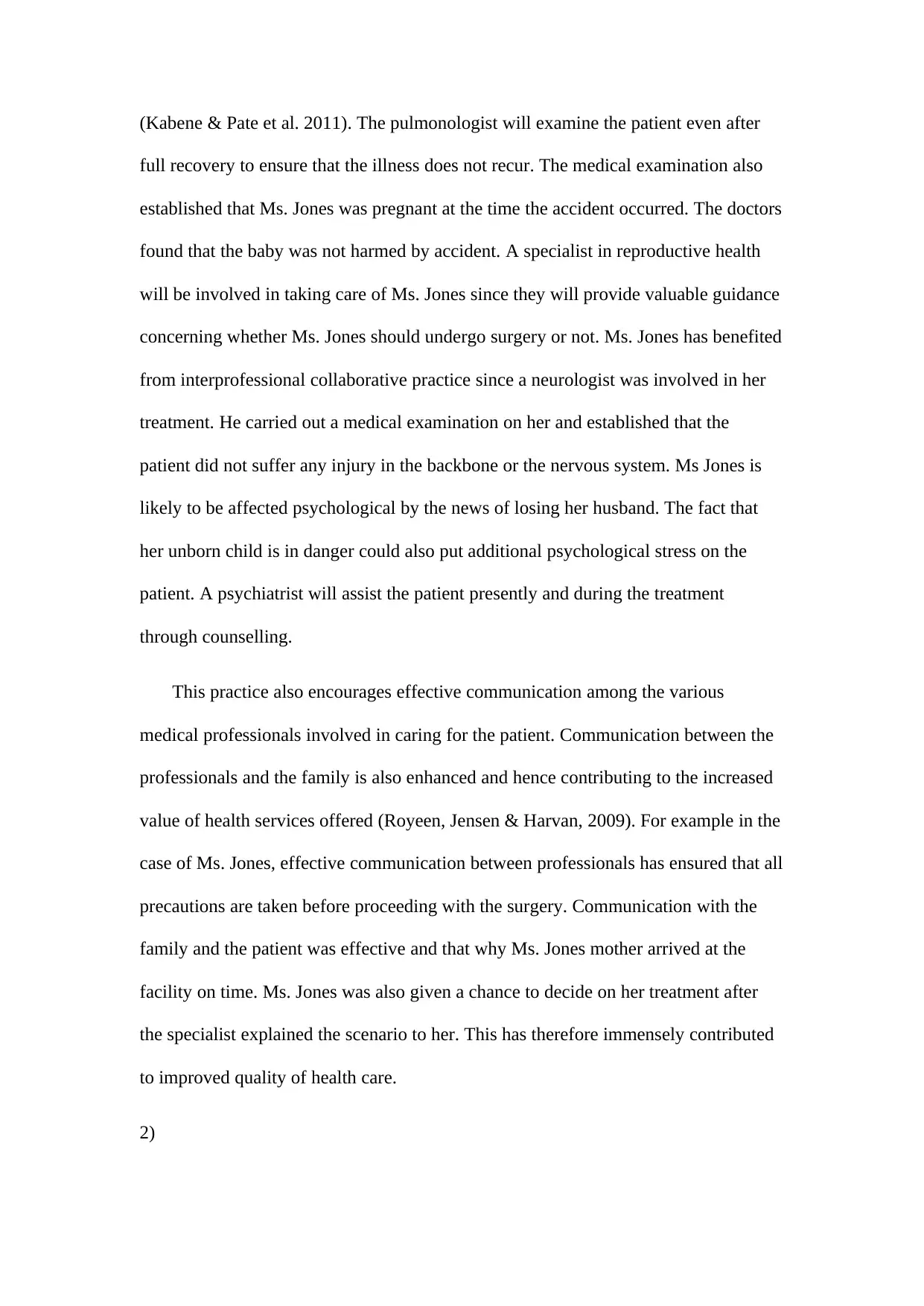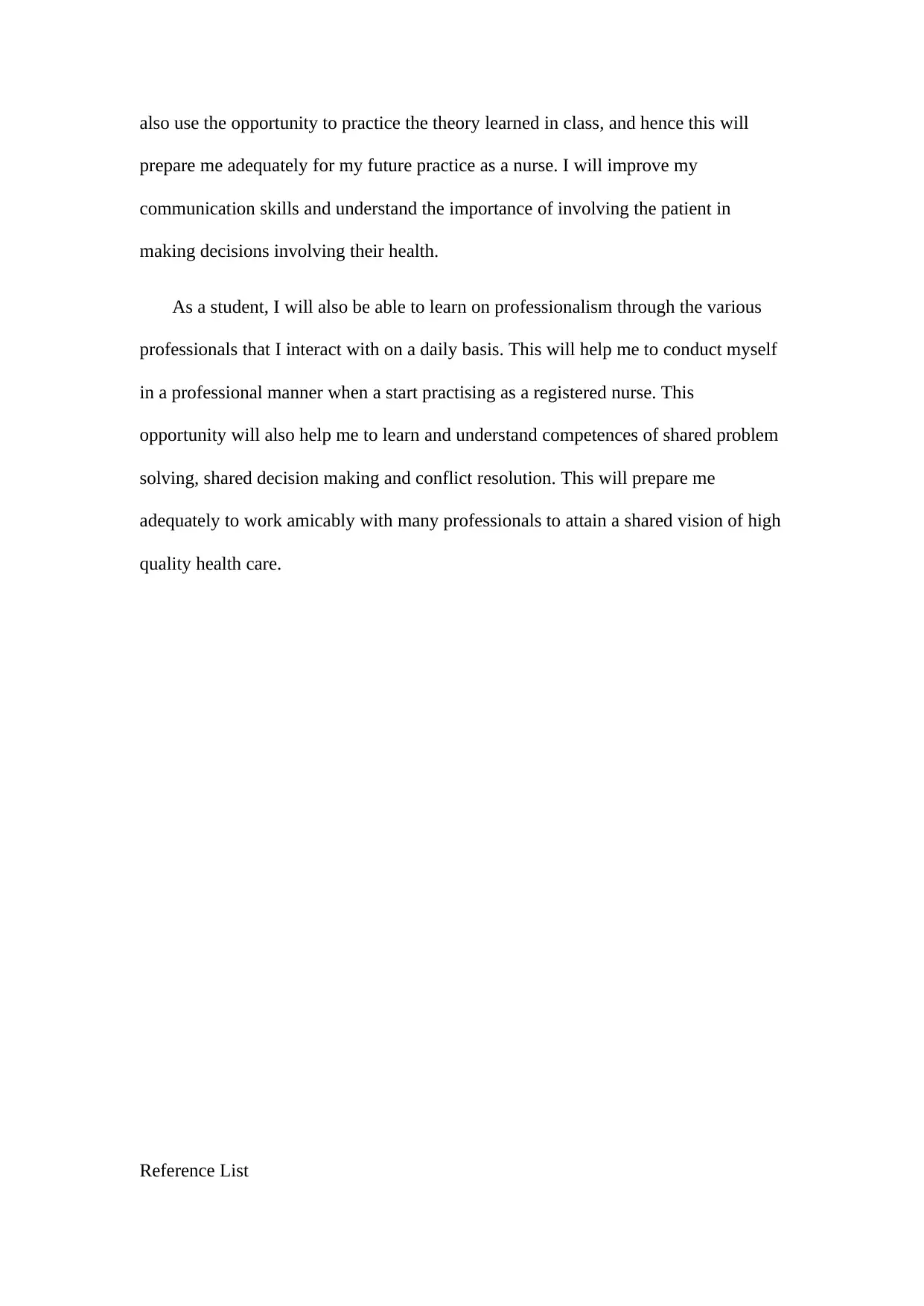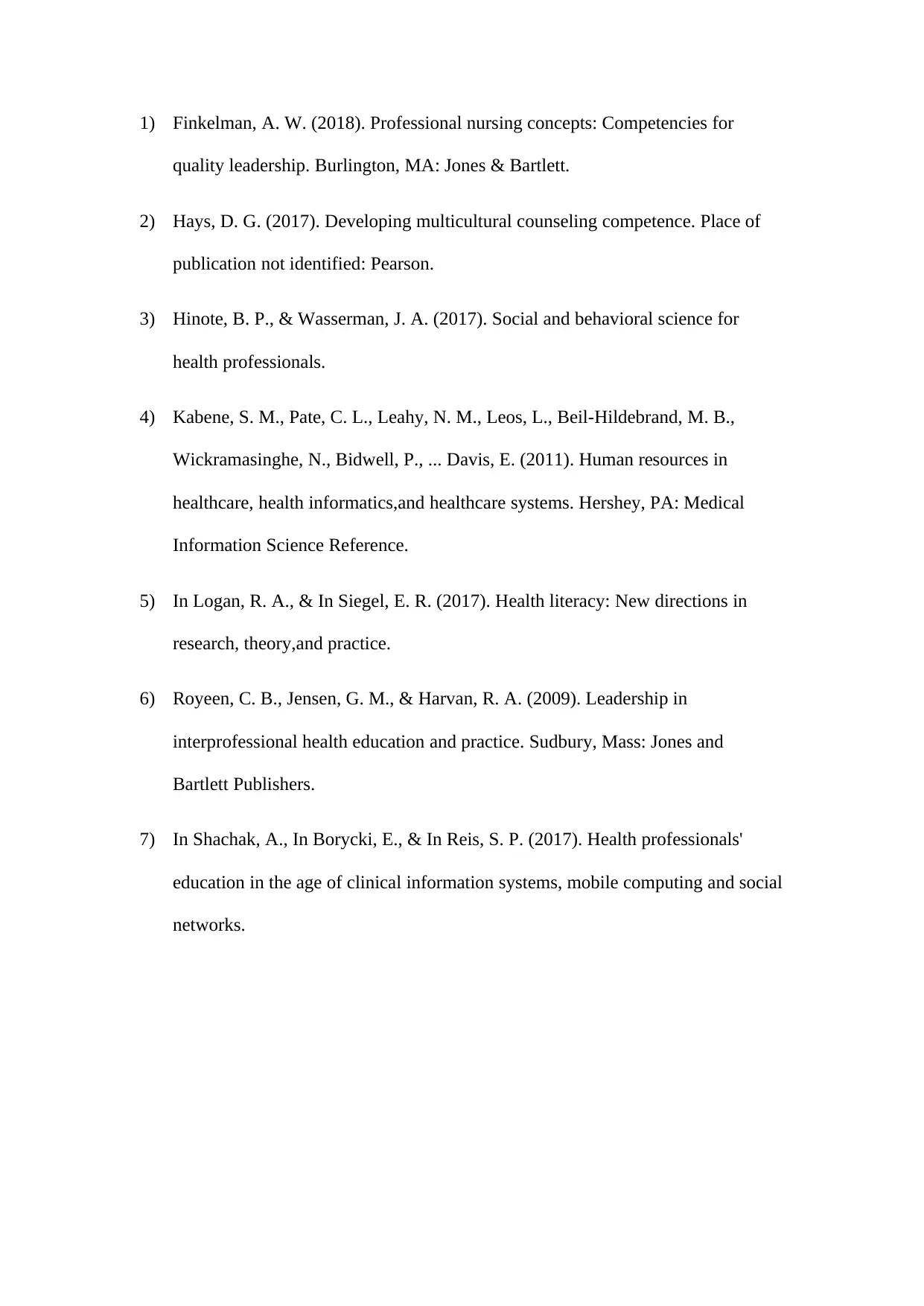Analysis of Interprofessional Collaborative Practice in Healthcare
VerifiedAdded on 2023/06/05
|6
|1366
|86
Report
AI Summary
This report analyzes interprofessional collaborative practice in healthcare, emphasizing its benefits for patient care and recovery. The report discusses a case study involving Ms. Jones, highlighting how a team of medical professionals, including nurses, specialists, and a psychiatrist, collaborated to address her various medical needs, including a punctured lung and pregnancy complications. The report also explores the advantages of this practice for a student registered nurse, such as developing interprofessional teamwork, learning core competencies like patient-centered care, and understanding the importance of communication and ethical considerations. The report references several studies and resources to support its findings, demonstrating the value of interprofessional collaboration in optimizing healthcare outcomes and preparing future healthcare professionals.

Name of student:
Registration number:
Unit code:
Unit Title:
Name of supervisor:
Date due:
Word Count: 999
Registration number:
Unit code:
Unit Title:
Name of supervisor:
Date due:
Word Count: 999
Paraphrase This Document
Need a fresh take? Get an instant paraphrase of this document with our AI Paraphraser

Q1
a)
Interprofessional collaborative practice in health care entails health professionals
combining their efforts and skills to help in providing quality health care services.
This practice has become very popular in the recent past. Research indicates that the
incorporation of patient preferences leads to higher value health care. Value also
increases when patients, their families,and society become responsible for factors that
influence health. In may 2011, the Interprofessional Education Collaboration
developed core competencies and principles that are ideal in collaborative
interprofessional practice in health care (Logan & Siegel, 2017). One of the values of
this practice is ensuring that individuals of all professions maintain a climate of
mutual respect and shared values. This is ideal in ensuring that health professionals
combine their knowledge and experience towards providing high-quality health care.
The other principles of the practice are teamwork and communication.
Interprofessional collaborative practice will optimize Ms. Jones recovery both
presently and in future because of a variety of reasons. One of the reasons is that the
knowledge of many health professionals such as nurses, orthopaedists,
psychiatrist,and other medical specialists will be combined to help the patient recover
quickly (Shachak, Borycki & Reis, 2017). A specialist physician will carry out an
examination to determine whether or not Jones has any broken joints or bones. Upon
carrying out tests, it was discovered that Ms. Jones suffered a punctured lung. A
pulmonologist will offer professional advice and treatment to Ms. Jones to help heal
her lungs and other parts of the respiratory system that could have been affected
a)
Interprofessional collaborative practice in health care entails health professionals
combining their efforts and skills to help in providing quality health care services.
This practice has become very popular in the recent past. Research indicates that the
incorporation of patient preferences leads to higher value health care. Value also
increases when patients, their families,and society become responsible for factors that
influence health. In may 2011, the Interprofessional Education Collaboration
developed core competencies and principles that are ideal in collaborative
interprofessional practice in health care (Logan & Siegel, 2017). One of the values of
this practice is ensuring that individuals of all professions maintain a climate of
mutual respect and shared values. This is ideal in ensuring that health professionals
combine their knowledge and experience towards providing high-quality health care.
The other principles of the practice are teamwork and communication.
Interprofessional collaborative practice will optimize Ms. Jones recovery both
presently and in future because of a variety of reasons. One of the reasons is that the
knowledge of many health professionals such as nurses, orthopaedists,
psychiatrist,and other medical specialists will be combined to help the patient recover
quickly (Shachak, Borycki & Reis, 2017). A specialist physician will carry out an
examination to determine whether or not Jones has any broken joints or bones. Upon
carrying out tests, it was discovered that Ms. Jones suffered a punctured lung. A
pulmonologist will offer professional advice and treatment to Ms. Jones to help heal
her lungs and other parts of the respiratory system that could have been affected

(Kabene & Pate et al. 2011). The pulmonologist will examine the patient even after
full recovery to ensure that the illness does not recur. The medical examination also
established that Ms. Jones was pregnant at the time the accident occurred. The doctors
found that the baby was not harmed by accident. A specialist in reproductive health
will be involved in taking care of Ms. Jones since they will provide valuable guidance
concerning whether Ms. Jones should undergo surgery or not. Ms. Jones has benefited
from interprofessional collaborative practice since a neurologist was involved in her
treatment. He carried out a medical examination on her and established that the
patient did not suffer any injury in the backbone or the nervous system. Ms Jones is
likely to be affected psychological by the news of losing her husband. The fact that
her unborn child is in danger could also put additional psychological stress on the
patient. A psychiatrist will assist the patient presently and during the treatment
through counselling.
This practice also encourages effective communication among the various
medical professionals involved in caring for the patient. Communication between the
professionals and the family is also enhanced and hence contributing to the increased
value of health services offered (Royeen, Jensen & Harvan, 2009). For example in the
case of Ms. Jones, effective communication between professionals has ensured that all
precautions are taken before proceeding with the surgery. Communication with the
family and the patient was effective and that why Ms. Jones mother arrived at the
facility on time. Ms. Jones was also given a chance to decide on her treatment after
the specialist explained the scenario to her. This has therefore immensely contributed
to improved quality of health care.
2)
full recovery to ensure that the illness does not recur. The medical examination also
established that Ms. Jones was pregnant at the time the accident occurred. The doctors
found that the baby was not harmed by accident. A specialist in reproductive health
will be involved in taking care of Ms. Jones since they will provide valuable guidance
concerning whether Ms. Jones should undergo surgery or not. Ms. Jones has benefited
from interprofessional collaborative practice since a neurologist was involved in her
treatment. He carried out a medical examination on her and established that the
patient did not suffer any injury in the backbone or the nervous system. Ms Jones is
likely to be affected psychological by the news of losing her husband. The fact that
her unborn child is in danger could also put additional psychological stress on the
patient. A psychiatrist will assist the patient presently and during the treatment
through counselling.
This practice also encourages effective communication among the various
medical professionals involved in caring for the patient. Communication between the
professionals and the family is also enhanced and hence contributing to the increased
value of health services offered (Royeen, Jensen & Harvan, 2009). For example in the
case of Ms. Jones, effective communication between professionals has ensured that all
precautions are taken before proceeding with the surgery. Communication with the
family and the patient was effective and that why Ms. Jones mother arrived at the
facility on time. Ms. Jones was also given a chance to decide on her treatment after
the specialist explained the scenario to her. This has therefore immensely contributed
to improved quality of health care.
2)
⊘ This is a preview!⊘
Do you want full access?
Subscribe today to unlock all pages.

Trusted by 1+ million students worldwide

As a student registered nurse, I stand to gain a lot by participating in caring for a
patient being treated using interprofessional collaborative practice. One of how I will
benefit from caring for Ms. Jones is that I will develop interprofessional teamwork
and learn interprofessional core competencies. Being involved in the treatment and
care of Ms. Jones will provide me with an opportunity to learn the core competencies
that are needed in interprofessional collaborative health care (Hinote & Wasserman,
2017). These core competencies include providing patient-centered care. This
involves providing health care services that focus on the specific needs of the patient
(Hays, 2017). This is very crucial in improving the quality of healthcare services since
different patients have different needs and hence requiring special attention. The
experience will prepare me in learning how to respect the preferences of a patient
under my care.Ms Jones was given a chance to decide on which treatment method she
preferred and the benefits and shortcomings of each method. She was hence able to
make an informed decision on her health. This demonstrates adherence to values and
ethics governing interprofessional collaborative health care. By understanding the
patient-centered approach to medical care, I will be able to offer physical comfort to
the patient under my care in the future. This will enable me to gain a lot of experience
in caring for the patient when I start professional practice.
As a student taking care of Ms. Jones, I will understand critical Inter-professional
values and ethics that are crucial in my future practice as a nurse. (Finkelman, 2018)
The values and ethics are patients centered with a community-oriented approach. The
values and ethics emphasize the importance of involving the family in caring for the
patient. The experience will teach me the importance of teamwork in optimizing the
quality of health care. I will gain important interpersonal skills that will help me to
interact and communicate well with other medical professionals in the team. I will
patient being treated using interprofessional collaborative practice. One of how I will
benefit from caring for Ms. Jones is that I will develop interprofessional teamwork
and learn interprofessional core competencies. Being involved in the treatment and
care of Ms. Jones will provide me with an opportunity to learn the core competencies
that are needed in interprofessional collaborative health care (Hinote & Wasserman,
2017). These core competencies include providing patient-centered care. This
involves providing health care services that focus on the specific needs of the patient
(Hays, 2017). This is very crucial in improving the quality of healthcare services since
different patients have different needs and hence requiring special attention. The
experience will prepare me in learning how to respect the preferences of a patient
under my care.Ms Jones was given a chance to decide on which treatment method she
preferred and the benefits and shortcomings of each method. She was hence able to
make an informed decision on her health. This demonstrates adherence to values and
ethics governing interprofessional collaborative health care. By understanding the
patient-centered approach to medical care, I will be able to offer physical comfort to
the patient under my care in the future. This will enable me to gain a lot of experience
in caring for the patient when I start professional practice.
As a student taking care of Ms. Jones, I will understand critical Inter-professional
values and ethics that are crucial in my future practice as a nurse. (Finkelman, 2018)
The values and ethics are patients centered with a community-oriented approach. The
values and ethics emphasize the importance of involving the family in caring for the
patient. The experience will teach me the importance of teamwork in optimizing the
quality of health care. I will gain important interpersonal skills that will help me to
interact and communicate well with other medical professionals in the team. I will
Paraphrase This Document
Need a fresh take? Get an instant paraphrase of this document with our AI Paraphraser

also use the opportunity to practice the theory learned in class, and hence this will
prepare me adequately for my future practice as a nurse. I will improve my
communication skills and understand the importance of involving the patient in
making decisions involving their health.
As a student, I will also be able to learn on professionalism through the various
professionals that I interact with on a daily basis. This will help me to conduct myself
in a professional manner when a start practising as a registered nurse. This
opportunity will also help me to learn and understand competences of shared problem
solving, shared decision making and conflict resolution. This will prepare me
adequately to work amicably with many professionals to attain a shared vision of high
quality health care.
Reference List
prepare me adequately for my future practice as a nurse. I will improve my
communication skills and understand the importance of involving the patient in
making decisions involving their health.
As a student, I will also be able to learn on professionalism through the various
professionals that I interact with on a daily basis. This will help me to conduct myself
in a professional manner when a start practising as a registered nurse. This
opportunity will also help me to learn and understand competences of shared problem
solving, shared decision making and conflict resolution. This will prepare me
adequately to work amicably with many professionals to attain a shared vision of high
quality health care.
Reference List

1) Finkelman, A. W. (2018). Professional nursing concepts: Competencies for
quality leadership. Burlington, MA: Jones & Bartlett.
2) Hays, D. G. (2017). Developing multicultural counseling competence. Place of
publication not identified: Pearson.
3) Hinote, B. P., & Wasserman, J. A. (2017). Social and behavioral science for
health professionals.
4) Kabene, S. M., Pate, C. L., Leahy, N. M., Leos, L., Beil-Hildebrand, M. B.,
Wickramasinghe, N., Bidwell, P., ... Davis, E. (2011). Human resources in
healthcare, health informatics,and healthcare systems. Hershey, PA: Medical
Information Science Reference.
5) In Logan, R. A., & In Siegel, E. R. (2017). Health literacy: New directions in
research, theory,and practice.
6) Royeen, C. B., Jensen, G. M., & Harvan, R. A. (2009). Leadership in
interprofessional health education and practice. Sudbury, Mass: Jones and
Bartlett Publishers.
7) In Shachak, A., In Borycki, E., & In Reis, S. P. (2017). Health professionals'
education in the age of clinical information systems, mobile computing and social
networks.
quality leadership. Burlington, MA: Jones & Bartlett.
2) Hays, D. G. (2017). Developing multicultural counseling competence. Place of
publication not identified: Pearson.
3) Hinote, B. P., & Wasserman, J. A. (2017). Social and behavioral science for
health professionals.
4) Kabene, S. M., Pate, C. L., Leahy, N. M., Leos, L., Beil-Hildebrand, M. B.,
Wickramasinghe, N., Bidwell, P., ... Davis, E. (2011). Human resources in
healthcare, health informatics,and healthcare systems. Hershey, PA: Medical
Information Science Reference.
5) In Logan, R. A., & In Siegel, E. R. (2017). Health literacy: New directions in
research, theory,and practice.
6) Royeen, C. B., Jensen, G. M., & Harvan, R. A. (2009). Leadership in
interprofessional health education and practice. Sudbury, Mass: Jones and
Bartlett Publishers.
7) In Shachak, A., In Borycki, E., & In Reis, S. P. (2017). Health professionals'
education in the age of clinical information systems, mobile computing and social
networks.
⊘ This is a preview!⊘
Do you want full access?
Subscribe today to unlock all pages.

Trusted by 1+ million students worldwide
1 out of 6
Related Documents
Your All-in-One AI-Powered Toolkit for Academic Success.
+13062052269
info@desklib.com
Available 24*7 on WhatsApp / Email
![[object Object]](/_next/static/media/star-bottom.7253800d.svg)
Unlock your academic potential
Copyright © 2020–2026 A2Z Services. All Rights Reserved. Developed and managed by ZUCOL.




